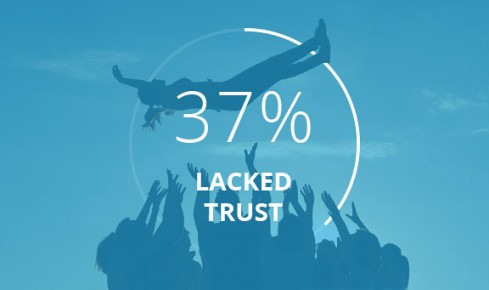Is Your Manager Trustworthy?

For a recent “Voice of the Workplace” survey, Waggl asked business professionals to weigh in on a juicy topic that affects every workplace: trust.
Interestingly, 37 percent of the participants in the study said they do not trust their immediate supervisor to make decisions with their best interest in mind. In contrast, 76 percent of participants said they trust their coworkers to follow through on their responsibilities and to keep the team’s best interests in mind; 84 percent said they trust and believe in the mission of their organization; and 81 percent reported their company trusts them to do their job well when working autonomously.

Here are some of the other key findings:
– Supervisor trust levels are highest in the nonprofit industry (80 percent) and among the youngest participants, ages 26-40 (74 percent). They were lowest in the advertising/marketing industry (40 percent) and among participants 41-55 years of age (55 percent).
– Coworker trust levels are highest on the West Coast (92 percent) and in the technology industry (90 percent). They are lowest in the South (58 percent) and in the nonprofit industry (60 percent).
– Organizational trust levels are highest in the South (100 percent) and among the oldest participants, ages 56-70 (88 percent). Respondents from the nonprofit and advertising/marketing industries responded unanimously that they trust the mission of their organizations.
– Autonomy levels are highest in the nonprofit industry (90 percent) and among participants age 26-40 (87 percent). They are lowest in the advertising/marketing industry (60 percent) and on the East Coast (74 percent).
– Trust levels are relatively equal in terms of gender, although men reported slightly higher levels of coworker trust (82 percent) than women (73 percent).
The survey also asked participants, “What could my organization do to inspire higher levels of trust?” and distilled crowdsourced responses into a ranked list. The top three answers were:
- “Become more transparent. Conduct direct and candid conversations rather than message indirectly through others.”
- “Upskill ‘people’ managers with the skills and knowledge to empower their people and lead by example, taking more of a coaching role than an old-fashioned ‘boss.'”
- “Remove unnecessary hierarchy, communicate more clearly, [and] be more honest about things we get wrong and what we are doing about them.”
In our current era of constant business disruption and change, cultivating a high level of trust is more important than ever if an organization wants to achieve agility and growth. As these pulse responses indicate, the best path to developing trust between individuals is to make a commitment to open, transparent communication, which in turn leads to more authentic relationships between employees, their immediate supervisors, and the larger organization. Creating an open, transparent forum for two-way dialogue builds connection, collaboration, and alignment across the organization.
A version of this article originally appeared on the Waggl blog.
Waggl is the most human way for organizations to crowdsource feedback.

